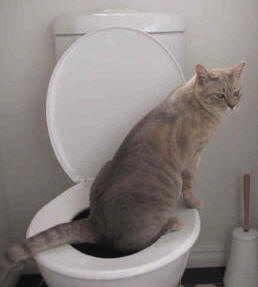Reasons You Should Never Flush Cat Poop Down Your Toilet - Important Information
Reasons You Should Never Flush Cat Poop Down Your Toilet - Important Information
Blog Article
What are your insights and beliefs on Can You Flush Cat Poop Down The Toilet??

Introduction
As cat owners, it's essential to be mindful of how we throw away our feline friends' waste. While it may seem hassle-free to purge feline poop down the toilet, this method can have harmful effects for both the environment and human wellness.
Environmental Impact
Purging cat poop presents unsafe microorganisms and bloodsuckers into the supply of water, posturing a significant risk to marine ecological communities. These pollutants can negatively influence marine life and compromise water top quality.
Health Risks
In addition to environmental concerns, flushing pet cat waste can also posture health risks to humans. Pet cat feces may include Toxoplasma gondii, a bloodsucker that can trigger toxoplasmosis-- a potentially extreme ailment, especially for expecting females and individuals with weakened body immune systems.
Alternatives to Flushing
The good news is, there are safer and more liable methods to take care of feline poop. Take into consideration the following alternatives:
1. Scoop and Dispose in Trash
The most common approach of taking care of cat poop is to scoop it right into a naturally degradable bag and toss it in the garbage. Make sure to use a dedicated clutter inside story and get rid of the waste without delay.
2. Usage Biodegradable Litter
Go with eco-friendly cat clutter made from products such as corn or wheat. These trashes are environmentally friendly and can be securely dealt with in the garbage.
3. Hide in the Yard
If you have a lawn, take into consideration burying feline waste in a designated area far from veggie gardens and water sources. Make certain to dig deep sufficient to stop contamination of groundwater.
4. Set Up a Pet Waste Disposal System
Purchase a pet dog waste disposal system specifically created for feline waste. These systems make use of enzymes to break down the waste, decreasing odor and ecological effect.
Final thought
Accountable pet dog ownership expands beyond offering food and sanctuary-- it also entails appropriate waste monitoring. By refraining from purging feline poop down the bathroom and choosing alternative disposal methods, we can decrease our environmental footprint and protect human wellness.
Why Can’t I Flush Cat Poop?
It Spreads a Parasite
Cats are frequently infected with a parasite called toxoplasma gondii. The parasite causes an infection called toxoplasmosis. It is usually harmless to cats. The parasite only uses cat poop as a host for its eggs. Otherwise, the cat’s immune system usually keeps the infection at low enough levels to maintain its own health. But it does not stop the develop of eggs. These eggs are tiny and surprisingly tough. They may survive for a year before they begin to grow. But that’s the problem.
Our wastewater system is not designed to deal with toxoplasmosis eggs. Instead, most eggs will flush from your toilet into sewers and wastewater management plants. After the sewage is treated for many other harmful things in it, it is typically released into local rivers, lakes, or oceans. Here, the toxoplasmosis eggs can find new hosts, including starfish, crabs, otters, and many other wildlife. For many, this is a significant risk to their health. Toxoplasmosis can also end up infecting water sources that are important for agriculture, which means our deer, pigs, and sheep can get infected too.
Is There Risk to Humans?
There can be a risk to human life from flushing cat poop down the toilet. If you do so, the parasites from your cat’s poop can end up in shellfish, game animals, or livestock. If this meat is then served raw or undercooked, the people who eat it can get sick.
In fact, according to the CDC, 40 million people in the United States are infected with toxoplasma gondii. They get it from exposure to infected seafood, or from some kind of cat poop contamination, like drinking from a stream that is contaminated or touching anything that has come into contact with cat poop. That includes just cleaning a cat litter box.
Most people who get infected with these parasites will not develop any symptoms. However, for pregnant women or for those with compromised immune systems, the parasite can cause severe health problems.
How to Handle Cat Poop
The best way to handle cat poop is actually to clean the box more often. The eggs that the parasite sheds will not become active until one to five days after the cat poops. That means that if you clean daily, you’re much less likely to come into direct contact with infectious eggs.
That said, always dispose of cat poop in the garbage and not down the toilet. Wash your hands before and after you clean the litter box, and bring the bag of poop right outside to your garbage bins.
https://trenchlesssolutionsusa.com/why-cant-i-flush-cat-poop/

We had been introduced to that editorial on How to Dispose of Cat Poop and Litter Without Plastic Bags through an associate on another web property. Sharing is good. You just don't know, you will be doing someone a favor. I cherish reading our article about Don’t flush cat feces down the toilet.
Book Instantly Report this page